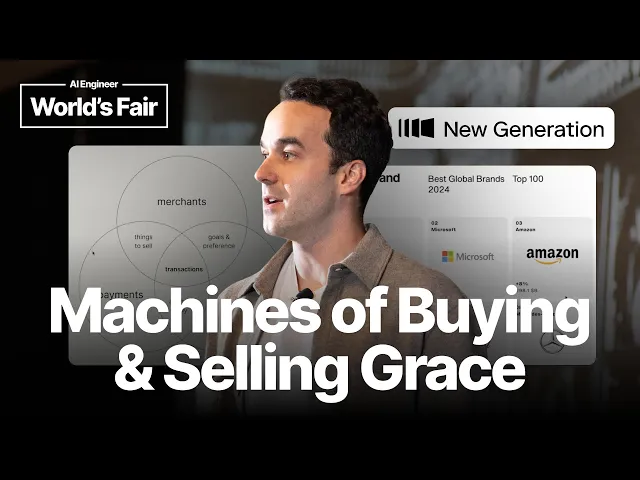Machines of Buying and Selling Grace – Adam Behrens, New Generation

Blockchain's growing impact on supply chains
In an era where supply chain disruptions have become front-page news, Adam Behrens of New Generation brings a compelling perspective on how blockchain technology might transform traditional buying and selling processes. His talk "Machines of Buying and Selling Grace" explores the intersection of trust, transparency, and technology in commercial relationships, offering a refreshing take on how distributed ledger systems could redefine business transactions.
Key insights from Behrens' presentation
-
Blockchain technology creates unprecedented transparency in supply chains by providing immutable records that all participants can access, effectively shifting business relationships from pure trust to verifiable trust.
-
The transition to blockchain-based systems represents more than a technological shift—it's a fundamental change in how we structure commercial relationships, removing the need for blind faith in counterparties.
-
Smart contracts enable self-executing agreements that automatically enforce terms when conditions are met, potentially eliminating the friction, delays, and disputes that plague traditional contract enforcement.
The trust revolution
The most profound insight from Behrens' talk is how blockchain fundamentally alters the trust equation in business relationships. For centuries, commerce has operated on a foundation of trust—or more accurately, the management of distrust through intermediaries, contracts, and legal systems. What blockchain offers isn't the elimination of trust, but rather its transformation into a more verifiable, transparent form.
This matters tremendously in today's business landscape. Supply chain vulnerabilities exposed during the pandemic have forced companies to reevaluate their dependencies and risk management strategies. According to a 2022 McKinsey survey, 90% of supply chain executives reported implementing significant changes to make their networks more resilient. Blockchain's promise of end-to-end visibility addresses this exact pain point, allowing businesses to move beyond reactive risk management toward proactive risk avoidance.
Beyond the buzzword: Real-world applications
While Behrens presents a compelling theoretical framework, it's worth examining how blockchain is already reshaping supply chains today. Walmart, for instance, implemented IBM's Food Trust blockchain to track food products through its supply chain. What used to take nearly seven days to trace the origin of produce can now be done in 2.2 seconds. During food safety scares, this speed differential isn't just about efficiency—it can prevent illness and save
Recent Videos
How To Earn MONEY With Images (No Bullsh*t)
Smart earnings from your image collection In today's digital economy, passive income streams have become increasingly accessible to creators with various skill sets. A recent YouTube video cuts through the hype to explore legitimate ways photographers, designers, and even casual smartphone users can monetize their image collections. The strategies outlined don't rely on unrealistic promises or complicated schemes—instead, they focus on established marketplaces with proven revenue potential for image creators. Key Points Stock photography platforms like Shutterstock, Adobe Stock, and Getty Images remain viable income sources when you understand their specific requirements and optimize your submissions accordingly. Specialized marketplaces focusing...
Oct 3, 2025New SHAPE SHIFTING AI Robot Is Freaking People Out
Liquid robots will change everything In the quiet labs of Carnegie Mellon University, scientists have created something that feels plucked from science fiction—a magnetic slime robot that can transform between liquid and solid states, slipping through tight spaces before reassembling on the other side. This technology, showcased in a recent YouTube video, represents a significant leap beyond traditional robotics into a realm where machines mimic not just animal movements, but their fundamental physical properties. While the internet might be buzzing with dystopian concerns about "shape-shifting terminators," the reality offers far more promising applications that could revolutionize medicine, rescue operations, and...
Oct 3, 2025How To Do Homeless AI Tiktok Trend (Tiktok Homeless AI Tutorial)
AI homeless trend raises ethical concerns In an era where social media trends evolve faster than we can comprehend them, TikTok's "homeless AI" trend has sparked both creative engagement and serious ethical questions. The trend, which involves using AI to transform ordinary photos into images depicting homelessness, has rapidly gained traction across the platform, with creators eagerly jumping on board to showcase their digital transformations. While the technical process is relatively straightforward, the implications of digitally "becoming homeless" for entertainment deserve careful consideration. The video tutorial provides a step-by-step guide on creating these AI-generated images, explaining how users can transform...
